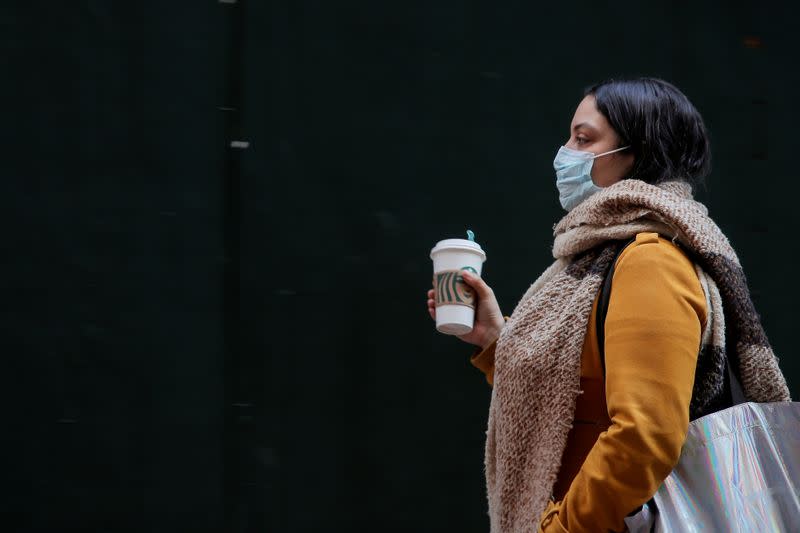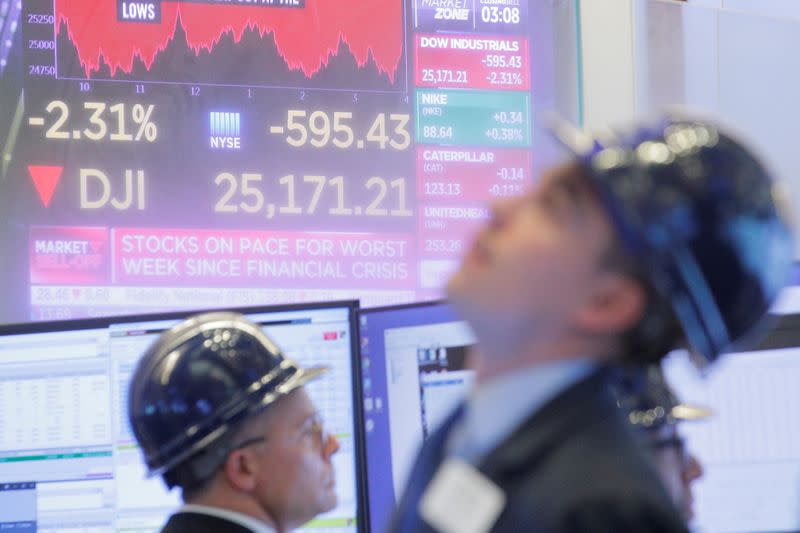Stock swoon hands investors fresh buying opportunities
By Lewis Krauskopf and Elizabeth Dilts Marshall
NEW YORK (Reuters) - Some of the world’s biggest investment firms are betting that one of the worst sell-offs in years is an opportunity to buy on the cheap.
UBS Global Wealth Management and Goldman Sachs Asset Management were among the firms adding to their portfolios or urging clients to buy in select areas during the market’s coronavirus-fueled sell-off, taking positions in everything from emerging market stocks to the shares of cruise companies.
Few said they are stepping in to bet on a sustained rebound in broader markets, even as stocks bounced Monday, after last week’s plunge knocked 11.5% off the S&P 500 in the index’s fastest correction in history. Yet some investors see the declines as an opportunity to stake out positions in assets whose valuations had become exceedingly stretched as markets marched higher in previous months.
"It’s a breath of fresh air to see a lot of the things that we would love to own getting to price points where we can actually start considering them,” said Michael Kon, director of research and portfolio manager at Summitry.
Summitry, which invests in businesses that trade at discounts to their intrinsic value, last week added to its position in shares of Walt Disney Co <DIS.N> and initiated a new position in Charles Schwab Corp <SCHW.N>, said Kon, whose San Mateo, California firm has $1.7 billion under management.
As the sell-off took hold last week, UBS Global Wealth Management highlighted to clients a chance to add stocks in the two of the firm's favored sectors - U.S. consumer discretionary <.SPLRCD> and U.S. communication services <.SPLRCL> - calling the sectors oversold.
Some companies in those sectors could even benefit in certain respects from the virus fears as consumers spend more time shopping online and on their screens, said David Lefkowitz, senior equity strategist at UBS Global Wealth Management.
"We still think having an overweight stance in these sectors is an attractive thing to do even if the virus concerns continue to weigh on the market,” Lefkowitz said.
Portfolio managers at Goldman Sachs Asset Management added to positions in the travel sector, including in hotels and cruises, and bought shares of Japanese cosmetics-maker Shiseido Co Ltd <4911.T> and events promoter Live Nation Entertainment <LYV.N>.
“This is the time when active managers should be able to protect capital on the downside and look for opportunities,” said Katie Koch, Goldman Sachs’ global co-head of equities for its asset management business.
David Kotok, chief investment officer of Cumberland Advisors, said he was buying stocks, particularly in the healthcare sector.
"It is the vehicle that we will fight the war against the virus with," Kotok said.
To be sure, even as investors sought select opportunities, the decline in stocks was proving to be a big challenge to investors' "buy the dip" mantra that has prevailed during the bull market that has lasted for over a decade.
Greenwood Capital, which has a three- to five-year investment horizon, was a net buyer of stocks last week during the pullback, but was not buying "super aggressively" as the firm sought to assess whether the coronavirus situation will push the economy into a recession, said Walter Todd, chief investment officer with the South Carolina firm.
“If we ultimately end up in a recession two quarters from now, there’s a lot more work on the downside to be done,” Todd said.
(Reporting by Lewis Krauskopf; additional reporting by Megan Davies and Elizabeth Dilts Marshall in New York; editing by Ira Iosebashvili)

 Yahoo Finance
Yahoo Finance 

